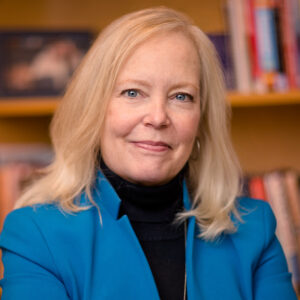Each month, we ask a member of faculty to tell us about one book that played an outsized role in making them who they are today. This month’s Words to Live By comes from Pauline Dakin, MFA’15, and Assistant Professor, Journalism, about the strange comfort and knowledge of the world she gained from the bizarre fairy tales of her childhood.
What book(s) have you chosen?
There are so many impressive, evocative books that I could choose from my adult reading, both fiction and non-fiction. But for impact and power, I think of a year of reading in my childhood. I’ve chosen an oeuvre more than a single book, and really a genre as there are several writers who contributed to the reading that awakened new ideas and understanding for me when I was eight years old. The writers were the Grimm Brothers, Hans Christian Andersen, Charles Perrault and even earlier, Giovanni Francesco Straparola. They wrote the folk tales, the literary fairy tales of Germany, Denmark, France and Italy respectively. Some of their stories have been popularized in sanitized, saccharine Disney movies. But in their original forms they were dark, elemental, and to me, electrifying.
 How and when did you come across these books?
How and when did you come across these books?
I discovered a shelf of fairy tale collections at the library during a class trip in Grade 3. I borrowed a couple of them, likely expecting the magic and princesses that little girls often find so compelling. They were not that! I read those books and spent the rest of the year obsessively making my way through the rest of the shelf. I discovered many countries had different versions of the same tales, but the themes were very similar.
What was it about these stories that first stood out to you?
I was struck by the simple, straightforward prose, but more so by the repeated and clear message that justice prevails, goodness is rewarded and that those who are calculating, powerful and on top can find themselves toppled and brought low. For example, in Perrault’s The Fairy, the despised younger daughter is granted a gift because she is sweet and polite; her words become flowers and jewels of value. She wins the love of a prince. The favoured, disagreeable daughter is sent to seek a gift as well. She returns speaking in vipers and toads. Her mother throws her out and she dies in the woods. Such muscular and visual metaphors, such retribution for unkindness appealed to something childish, but also prompted a lot of thought about the way the real world operates, and gave me a window into very adult themes. These sometimes bizarre or fanciful, often violent and brutal tales were not originally intended for a young audience and in fact I hadn’t found them in the children’s section of the library. The abandoned children, murderous adults (often evil stepmothers) and exacting morality felt forbidden and alluring to an eight-year-old. My mother had no idea that fairy tales were taking me to such dark places!
How did these books shape you?
Albert Einstein said, “If you want your children to be intelligent, read them fairy tales. If you want them to be more intelligent, read them more fairy tales.” I don’t know whether doing so made me more intelligent, but these stories made me question things I likely would not otherwise have thought about until I was much older. It also prompted a lot of thought about the way the real world operates, and the concept of fairness. The sadness and tragedy of stories such as The Little Match Girl about a barefoot child who experiences visions of hope and home even as she freezes to death in an alley was my first experience of awareness of circumstances so much different than my own, and this created empathy.
There are critics and psychoanalysts who believe that the cruelty of fairy tales helps children grapple with fears and adjust to the difficulties and unfairness of life. Others say they teach them to see the oppressiveness of the world and create a desire to reform it. For me, I think they offered a certain equanimity about hardship, and a reassuring sense of justice. Even the Little Match Girl was taken to heaven by her beloved grandmother and died with a smile on her lips… a more nuanced happy ending I guess.
What do you think it is about these books that made such an impact?
There was something thrilling, and even illicit about these stories, but also comforting. The good prevail. Justice is served. Evil is punished. Things usually work out as they should. At the time I was devouring them my parents had just been through an acrimonious divorce. Maybe I was particularly open to stories that mirrored a feeling of darkness, or that suggested difficulties are universal and can be overcome through perseverance.
Have you reread these books? Do they resonate differently today than they did on first reading?
I have reread some of these stories and as an adult I feel differently about the simplistic tropes of the storytelling and see the problematic elements. The Grimm tales are nationalistic and seen as a pre-curser to Aryanism. Women are often seen as passive and in need of rescuing, unless they’re wicked stepmothers wielding hatchets or serving poisonous dinners. Child abuse is common and often gory. Even so, fairy tales have had an outsized and long-lasting effect on our culture. That still resonates.

